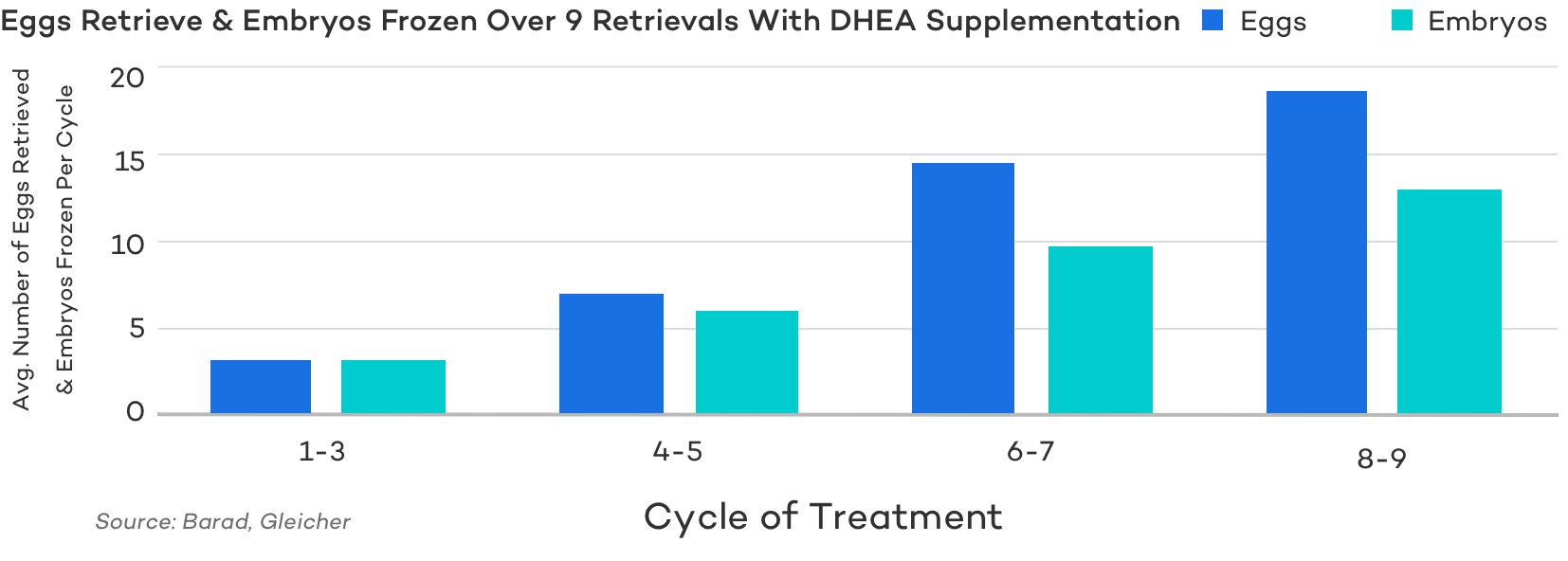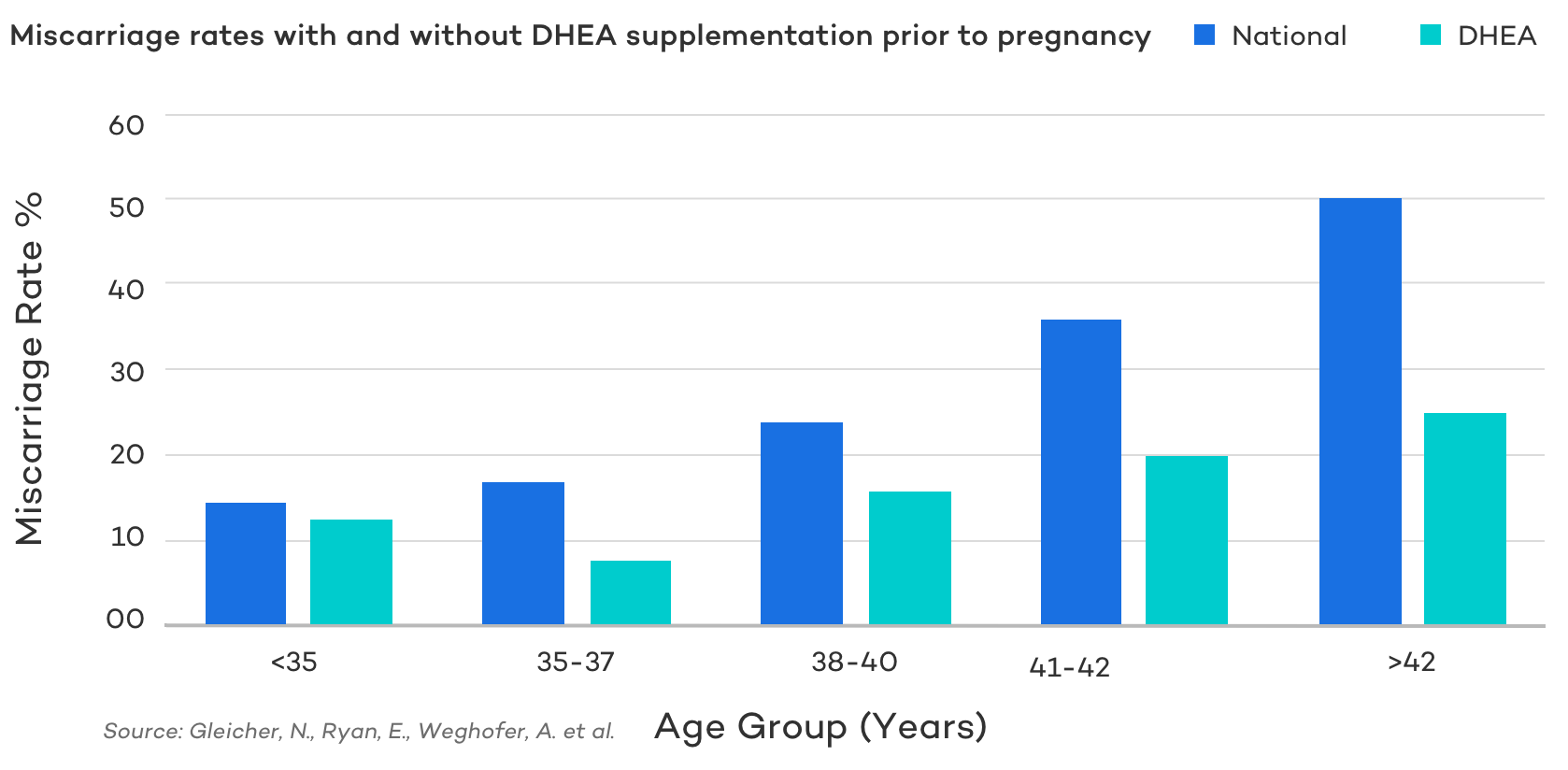DHEA for Fertility

DHEA (dehydroepiandrosterone) is a hormone that is naturally produced and secreted by the adrenal glands (and, to a minor extent, the ovaries and testes) in both men and women. It is a precursor for many other hormones of reproductive significance, including testosterone, which surprisingly plays a very important role in female fertility.
Unfortunately, the body’s ability to synthesize DHEA declines with age. Levels peak from age 20-30 and then decline at an average rate of 2% per year thereafter. Through the course of adulthood, DHEA levels may decrease as much as 80%, with significant declines already realized in many by age 40, if not earlier.
Because DHEA supplementation has been shown in some studies to support egg quality (reduce aneuploidy in embryos), increase the number of eggs that reach maturity each month, increase pregnancy rates, and reduce the odds of pregnancy loss, DHEA supplementation for fertility has become a topic of supreme interest for those trying to get pregnant.
In this article, we will review what DHEA is, how it improves fertility, who should take it, potential side effects, common dosages, and more.
Fast Facts on DHEA for Fertility
- What it is: DHEA (dehydroepiandrosterone) is a precursor hormone that helps the body produce essential reproductive hormones, including estrogen and testosterone.
- Age-related decline: Natural DHEA levels decrease with age, which can contribute to reduced fertility potential.
- Fertility benefits: Research shows that supplementing with DHEA may improve egg quality, ovarian function, and overall pregnancy rates, especially for women with diminished ovarian reserve (DOR).
- Pregnancy outcomes: DHEA supplementation before conception has been linked to lower rates of pregnancy loss.
- Who it helps: DHEA is often recommended for women with Diminished Ovarian Reserve (DOR) or Primary Ovarian Insufficiency (POI), conditions that can occur naturally with age (typically after 40) or earlier in life.
- Timing: The effects of DHEA build gradually. Most benefits begin after 1–2 months and peak after about 4–5 months of consistent use.
- Dosage: The most commonly used fertility dose is 25 mg taken three times daily (a total of 75 mg per day).
- Safety: Side effects at this dosage are uncommon and typically mild when DHEA is taken under medical supervision.
How DHEA Improves Fertility
While the exact mechanism by which DHEA enhances fertility isn’t fully understood, the leading theory suggests that supplementing with DHEA improves the hormonal environment within the ovary. This improved environment supports the development of higher-quality eggs when they are recruited for maturation.
To understand how this works, it helps to step back and look at the biology of egg development:
- A woman is born with all the eggs she will ever have. They remain in an immature state until recruited for development later in life.
- Each month, roughly 1,000 eggs begin this recruitment process, with only one ultimately reaching ovulation and the chance of fertilization.
For many years, it was assumed that all eggs—including those still dormant—degrade over time as a woman ages.
However, recent research suggests that these immature eggs may remain in good condition. The issue lies not in the eggs themselves but in the ovarian environment they mature in.
By the time eggs are recruited for ovulation, they may encounter a less supportive hormonal environment, leading to lower-quality development.
So, what creates a poor ovarian environment?
One major factor is low levels of DHEA and testosterone, which are often seen in women with Diminished Ovarian Reserve (DOR). Women in this group tend to benefit most from DHEA supplementation.
Though testosterone is commonly thought of as a “male” hormone, it plays a vital role in female fertility, particularly in the early stages of follicle and egg maturation within the ovary.
When DHEA is taken as a supplement, it increases circulating levels of DHEA, testosterone, and estrogen, restoring a more youthful hormonal balance within the ovary. In doing so, newly recruited eggs begin to mature in a healthier, more supportive environment, ultimately improving egg quality and overall fertility outcomes.
Proper egg development then leads to:
- improved ovarian response (aka more eggs)
- higher pregnancy rates
- lower miscarriage rates
DHEA and Ovarian Reserve/Response
One of the earliest studies to highlight the potential of DHEA for fertility was a detailed case report following a single patient who experienced progressive improvements in both egg quantity and quality over time with continued supplementation.

Although this is a case study of a single individual, the results are noteworthy, and other larger studies have demonstrated similar findings.
DHEA Supplementation and Pregnancy Rates
Studies have shown that DHEA supplementation can significantly improve egg and embryo quality in individuals with Diminished Ovarian Reserve (DOR).
It follows, then, that numerous studies have also found higher pregnancy rates among those who supplement with DHEA compared to those who do not. [referencesPending link=”Dehydroepiandrosterone (DHEA) supplementation improves in vitro fertilization outcomes of poor ovarian responders, especially in women with low serum concentration of DHEA-S: a retrospective cohort study” text=”Dehydroepiandrosterone (DHEA) supplementation improves in vitro fertilization outcomes of poor ovarian responders, especially in women with low serum concentration of DHEA-S: a retrospective cohort study”/]
In one study, the pregnancy rate among women taking DHEA reached 24%, compared to just 4% in the control group. Another study (depicted below) reported similar findings, with 25% pregnancy rates in the DHEA group versus 7% in those not taking the supplement.

DHEA Supplementation Effect on Miscarriage Rates
Multiple studies have demonstrated that DHEA supplementation prior to conception can significantly reduce the risk of miscarriage once pregnancy is achieved.
This protective effect is believed to occur because DHEA reduces the number of eggs with chromosomal abnormalities. Genetic abnormalities—known as aneuploidy—are the leading cause of early pregnancy loss.
One representative study found that miscarriage rates were cut roughly in half among women over 41 who supplemented with DHEA before conceiving.
What makes these findings even more remarkable is that the women in the DHEA group all had diminished ovarian reserve, a population typically at higher risk of miscarriage than the general population. Despite this, their outcomes surpassed national averages. These findings underscore DHEA’s potential to meaningfully improve pregnancy success and reduce loss.

Summary of how DHEA works for Fertility
- Women with Diminished Ovarian Reserve (DOR) benefit the most from taking DHEA.
- Those with DOR have lower levels of DHEA and Testosterone.
- Testosterone is critically important for the early stages of egg maturation.
- Supplementing with DHEA increases Testosterone levels within the Ovary.
- Newly recruited eggs now develop inside a “hormonally youthful” and healthy ovary and thus develop normally at higher rates.
- Normal, healthy ovaries and eggs lead to a better ovarian response, improved egg quality, higher pregnancy rates, and lower miscarriage rates.
Who Should Take DHEA for Fertility
The consensus on who benefits from taking DHEA has changed over time. Initially, only women who had previously failed at least one IVF cycle and were over 42 were targeted as candidates for supplementation. By 2005, the consensus changed, and DHEA was suggested for all women above 40 who had failed an IVF cycle and displayed evidence of poor ovarian reserve. By 2006, it was determined that women under the age of 40 also benefited if they had elevated FSH levels (above 10 mIU/ml) and had at least one failed IVF cycle.
Currently, most fertility clinics recommend all women over 40 trying to get pregnant and younger women if they have DOR/POF (characterized by high FSH levels and or low AMH levels).
When To Take DHEA Summary
| Age | FSH (tested on day 2-4 of cycle) | AMH (tested any day of cycle) |
| 40+ | FSH > 10 mlU/mL | AMH <1.0 ng/mL |
At CNY, we generally classify high FSH as over 10 and low AMH as under 1.
In most cases, we recommend DHEA for anyone who hits 1 or more of these targets. Women with PCOS are a general exception to this rule and usually should not take DHEA, as they often have elevated levels of testosterone naturally.
DHEA for Fertility Dosage
The standard recommended dose of DHEA for fertility is 75 mg of micronized DHEA per day, though morbidly obese individuals may benefit from up to 100 mg daily.
Ideally, the 75 mg dose is divided into three 25 mg doses taken throughout the day, helping to maintain a steady hormonal balance and minimizing the risk of mild side effects, such as stomach discomfort, that can occur with oral supplementation.
This dosing strategy has been widely adopted as the clinical standard, as it consistently produces optimal increases in DHEA and testosterone levels in research studies.
How Long does DHEA take to Work for Fertility?
One should aim for at least 6-8 weeks of DHEA supplementation prior to a fertility treatment cycle. That said, the effects of DHEA increase over time and reach their peak after approximately 4-5 months. DHEA supplementation should generally be continued past 4-5 months until pregnancy is achieved.
DHEA Supplementation Side Effects
There are a few potential side effects of females supplementing with DHEA for fertility that one should be aware of before taking the hormone-based supplement.
Positive “Side Effects”
- improved vitality
- improved sex drive, libido, and general sexual health
Negative “Side Effects”
- Acne and oily skin
- Hair loss
- Upset stomach
- High blood pressure
- Changes in the menstrual cycle
- Facial hair
- Fatigue
- Nasal congestion
- Headache
- Insomnia
While most of the negative side effects are very rare at doses under 100mg/day, they are important to keep in mind.
It is also important to know that most of the side effects are quickly reversed simply by lowering the DHEA dosage or stopping supplementation altogether.
Interactions and possible contraindications
As mentioned, small portions of DHEA are converted into estrogen, and as such, estrogen levels are likely to increase. If increased levels of estrogen are a problem (as they are in certain types of breast cancers), one should not use DHEA.
Similarly, some people, like those with PCOS, already have high levels of DHEA and should not supplement with DHEA unless otherwise specified by their healthcare provider.
As with all supplements, there could be other interactions and contraindications, so it is advisable to consult with your healthcare provider before taking DHEA.
DHEA for Fertility: The Bottom Line
DHEA is a hormone that has been studied extensively as a dietary supplement and has repeatedly been shown to improve fertility outcomes.
Along with diet, DHEA is a critical part of improving egg quality after 40 and for anyone with a Diminished Ovarian Reserve.
If you fit into one of these populations, supplementing with DHEA and CoQ10 prior to pregnancy may be one of the best things you can do to increase your fertility and overall odds of pregnancy.


